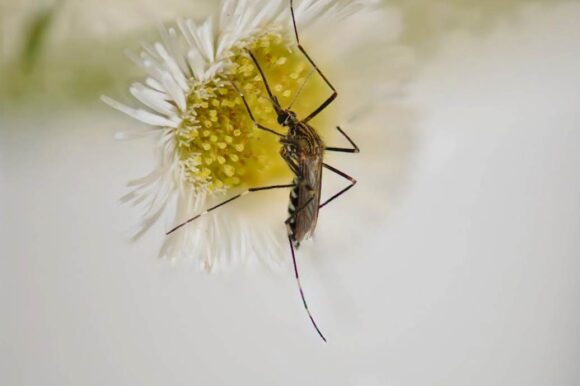
By Nicole E. Wagner, Senior Research Technician; Grayson A. Tung, doctoral student; and Dina M. Fonseca, Director, Rutgers Center for Vector Biology
With longer days and warmer temperatures returning, many of us look forward to spending time in our gardens tending to flowers and anticipating the taste of fresh produce. But one thing gardeners do not look forward to is the return of mosquitoes, whose bites not only cause itchy welts, but in the northeastern U.S. may transmit dangerous diseases.
Each year in the U.S., mosquito-borne viral infections result in hundreds of human cases of debilitating encephalitis (brain inflammation) and in rare instances, incapacitation, or death. Mosquitoes can also transmit heartworm to dogs and cats, putting our companion animals at risk. The first step in reducing the number of biting mosquitoes in your garden is putting away, draining, or covering all buckets, plant saucers, small fishless ponds, rainwater extensions, etc., that can accumulate standing water needed for the development of the immatures of urban mosquito species. Talk to your neighbors to nudge them to do the same; a single “productive” yard can result in a miserable summer for an entire neighborhood.
But if you live next to a wetland where native mosquitoes can thrive or, much worse, if you have a neglectful neighbor, what is a resourceful gardener to do? A quick internet search will provide lists of plants whose fragrances may act as natural mosquito repellents—but how effective are they? Can certain plants protect you from mosquito bites? How do mosquitoes interact with plants?
Many plants produce compounds that can repel mosquitoes but require additional steps to extract the repellent. Case in point—oil of lemon eucalyptus (Corymbia citriodora) is a commercially available plant-based repellent sanctioned by the Centers of Disease Control and Prevention (CDC). Likewise, catnip or catmint (Nepeta cataria) oil is repellent to mosquitoes, and a recent study proposed that cats’ enthusiasm for the plant, which they rub on their heads, may have developed to avoid being bitten.
Importantly, there is evidence that the simple presence of certain plants can repel mosquitoes. For example, in controlled studies several Lantana species, an African flowering bush, effectively prevented mosquitoes from entering homes when grown in large masses around the house. Lantana are annuals in the northeast U.S. that, once established, require little maintenance. However, care should be taken as this plant is poisonous to children and dogs and can become invasive in warmer regions. Another study found that marigolds (several Tagetes species) reduce mosquito biting in experimental tents where whole plant material had been previously stored. With their striking flowers and tolerance for poor soil, marigolds are an attractive option as a potential mosquito repellent plant although significant effects will likely require large numbers and strategic placement.
For gardeners with a penchant for herbs, fresh lemon basil, Ocimum canum, and hoary basil, Ocimum americanum, have both been shown to repel mosquitoes and reduce landing rates on humans in small, enclosed gardens or greenhouses, although their effectiveness in open landscapes has yet to be determined. Of note, both basil species were most effective when lightly bruised to enhance the release of repellent compounds.
While we tend to focus primarily on the blood-feeding female mosquitoes, all adult mosquitoes must feed on plant nectar that provides the sugars, proteins, fats, water, and essential nutrients necessary for their survival. Therefore, the degree to which certain plants can help minimize mosquito bites in your garden depends on existing attractive nectar sources. For example, the common garden impatiens, Impatiens walleriana, is highly attractive to mosquitoes that feed on the luxurious blooms. Nutritious plants and lush, humid gardens can increase the lifespan of adult mosquitoes, which can then lead to more bites and more disease transmission.
As always, a multifaceted approach is best. If you want to add mosquito repellent plants to your garden, make sure you will also enjoy them for their colors, aromas, or flavors, and do not rely on them exclusively for mosquito control. For the best protection from urban/backyard mosquitoes in New Jersey which are most likely to bite you, follow the usual guidance. Put away or discard sources of standing water. Cover water containers or pre-treat the water with mosquito dunks or bits which contain organisms that specifically kill mosquitoes. Apply an approved repellent at regular intervals (make sure to check the label) to exposed skin or, if you can stand it, wear long sleeves and long pants for protection from bites. Choose white or lighter color clothes because day-biting mosquitoes, which are those most likely to pester you when you are gardening, will then be less likely to bite you. Taking the proper precautions throughout the growing season will make gardening more enjoyable and ensure that your plants, and not you, are what any mosquitoes in your garden will feed on.
This article originally appeared in the June, 2021 issue of Gardener News.

